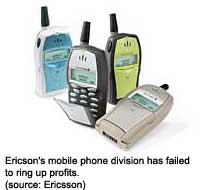|
Ericsson pulls phone plug
|
 |
January 26, 2001: 9:33 a.m. ET
Swedish mobile phone maker to quit handset production; cuts sales forecast
|
LONDON (CNNfn) - Ericsson, the world's leading maker of cellular networks, said it will quit mobile phone production and cut its sales growth forecast for 2001.
The third biggest handset maker made the announcement as it reported fourth quarter profit below expectations, dragged down by a 10.3 billion crowns ($1.1 billion) loss in its mobile phone unit.
The Stockholm-based company cut its forecast for sales growth in 2001 to between 15 and 20 percent, from an earlier estimate of over 20 percent, and said it would only break even in the first quarter.
 Ericsson's handset unit "has been losing market share to Siemens, the fourth-largest handset maker, and Nokia," Jeremy Batstone, an analyst at Natwest Stockbrokers, told CNNfn. "Its performance has been diabolical." Ericsson's handset unit "has been losing market share to Siemens, the fourth-largest handset maker, and Nokia," Jeremy Batstone, an analyst at Natwest Stockbrokers, told CNNfn. "Its performance has been diabolical."
The company said fourth-quarter net profit plunged 64 percent to 2.2 billion crowns, or 0.28 crowns per share, from 6.3 billion, or 0.78 crowns, in the same period in 1999.
Ericsson posted an operating loss of 1.5 billion crowns, compared with a gain of 8.7 billion crown in fourth quarter 1999. The loss excluded a one time 15.4 billion gain from the sale of its Juniper Networks and an 8 billion crown charge for pulling the plug on its phone making business. Analysts expectations varied widely from a much smaller loss to a profit of 1 billion crowns.
Ericsson said it will outsource handset production to Singapore-based electronic company Flextronics International, which will take over its plants in Brazil, Malaysia, Sweden, the U.K. and the U.S.
Ericsson shares sank 13 percent to 103 crowns in Stockholm afternoon trade.
Ericsson's woes rattled investors who are worried about how telecom equipment makers will manage huge costs and debts after pouring funds into high speed network development.
Analysts said they were disappointed Ericsson had not gone far enough in distancing itself from phone production because it will still control marketing, technology and design of handsets.
Ericsson chief executive Kurt Hellstrom told CNN the outsourcing was a good move and remained upbeat about the company's prospects, despite an uncertain economic outlook and more cautious market.
"A boom doesn't last forever and it doesn't go the other way for very long either," Hellstrom said.
"Next year we're likely to see continued deceleration in mobile systems revenue growth and a further decline in operating profitability due to increased spending associated with 3G. That's going to be a difficult environment for the stock," Jeffrey Schlesinger, analyst at UBS Warburg told CNNfn.com. 3G, or third generation, is a high speed network.
Mobile phone unit losses balloon
Ericsson's mobile phone division has been losing money since the second quarter of 2000, blaming component shortages after a fire at one of its main suppliers, Philips Electronics, and an uncompetitive product mix.
Ericsson has lost market share to Finland's Nokia, the world's biggest phone maker, which has come out with trendier and more popular models, analysts said.
The company will reduce its workforce to 7,000 people from 16,800 at the end of 2000, with 4,200 to join Flextronics and most others being transferred to other units of Ericsson. Around 700 employees will be cut, Hellstrom said.
The company said its 2001 operating margin was expected to be in the range of 6 to 8 percent. Operating margin, a measure of a company's underlying profitability, is operating profit as a percentage of sales.
In the first quarter, Ericsson income before tax is expected "to be around zero, affected by operating losses in phones and increased 3G investments."
The gloom spread to other stocks in the telecom equipment maker sector, with Nokia, down 2.6 percent at  39.60, Germany's Siemens losing 3.7 percent to hit 39.60, Germany's Siemens losing 3.7 percent to hit  152.83, France's Alcatel losing 5.3 percent to 152.83, France's Alcatel losing 5.3 percent to  60.60. 60.60.
Ericsson also said it had signed another agreement with Taiwanese manufacturer GVC for mobile phone development and production. 
|
|
|
|
|
 |

|

